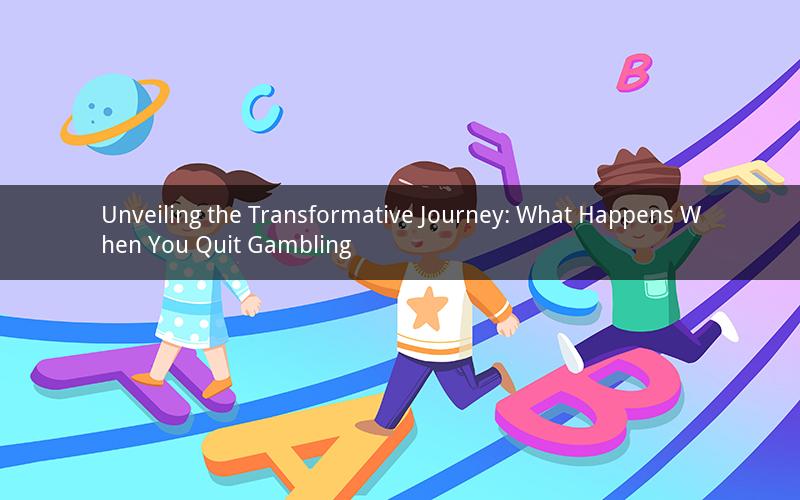
When you quit gambling, a world of transformation unfolds. The journey is both challenging and rewarding, as it demands determination and self-discipline. In this article, we delve into the various aspects that occur when you decide to take a break from the gambling world. Let's explore the emotional, psychological, and financial implications that accompany this life-changing decision.
Emotional Changes
1. Relief and Peace: The moment you quit gambling, you experience a profound sense of relief. The constant worry and stress of chasing losses disappear, giving way to inner peace. You find solace in the knowledge that you have taken control of your life.
2. Improved Relationships: As you detach yourself from the gambling addiction, your relationships with loved ones start to flourish. Trust is rebuilt, and communication becomes more meaningful. You have the time and energy to invest in your relationships, fostering deeper connections.
3. Enhanced Self-Esteem: Quitting gambling often leads to a boost in self-esteem. You take pride in your ability to overcome addiction and make positive changes. This newfound confidence can extend to other areas of your life, leading to personal growth.
Psychological Changes
1. Reduced Anxiety: Gamblers often experience high levels of anxiety, as they are constantly worried about their next bet and the potential losses. Quitting gambling helps alleviate these anxieties, leading to a more relaxed and peaceful mind.
2. Improved Concentration: With the removal of gambling from your life, you may notice an improvement in concentration. You can focus on tasks without the distraction of thoughts about gambling, leading to increased productivity.
3. Increased Resilience: Overcoming a gambling addiction strengthens your resilience. You learn to face challenges head-on and develop coping mechanisms to deal with stress and temptation. This newfound strength can be applied to other areas of your life.
Financial Changes
1. Improved Financial Stability: Quitting gambling means taking control of your finances. You can allocate funds to savings, investments, and other important areas of your life. Financial stability brings peace of mind and reduces stress.
2. Reduced Debt: Many gamblers accumulate significant debt due to their addiction. Quitting gambling helps you tackle this debt, leading to a more secure financial future. You can start rebuilding your credit and regaining financial independence.
3. Increased Savings: As you focus on saving and investing, you may find that your savings grow at an accelerated pace. This newfound financial discipline allows you to achieve your long-term goals, such as buying a house, paying for education, or starting a business.
Social Changes
1. Enhanced Social Life: Quitting gambling opens up opportunities to engage in new social activities. You can spend quality time with friends and family, attend events, and explore hobbies that you may have neglected during your gambling days.
2. Improved Reputation: As you distance yourself from the gambling world, your reputation may improve. People may view you as a more reliable and responsible individual, leading to better social interactions and networking opportunities.
3. New Friendships: You may find that your interests and values align more closely with individuals who do not engage in gambling. This can lead to the formation of new friendships and connections, enriching your social life.
Challenges and Support
1. Temptation: Quitting gambling can be challenging, especially when faced with temptation. Surround yourself with a supportive network of friends, family, and professionals who can help you stay on track.
2. Triggers: Certain situations or environments may trigger the urge to gamble. Learn to recognize these triggers and develop coping strategies to navigate them effectively.
3. Professional Support: Seek professional help from therapists, counselors, or support groups dedicated to helping individuals overcome gambling addiction. They can provide guidance, support, and resources to help you on your journey.
In conclusion, quitting gambling is a transformative journey that brings about a multitude of positive changes in your life. From emotional and psychological benefits to improved financial stability and social connections, the rewards are numerous. While challenges may arise, seeking support and maintaining determination can help you overcome them. Embrace this journey and watch as your life unfolds into a brighter future.
Questions and Answers:
1. How long does it take to notice the emotional changes after quitting gambling?
Answer: The timeline for emotional changes varies from person to person. Some individuals may experience immediate relief, while others may take several months to see significant improvements.
2. Can quitting gambling lead to improved relationships with family and friends?
Answer: Absolutely. Quitting gambling can strengthen relationships as trust is rebuilt, and you invest more time and energy into nurturing those connections.
3. Is it possible to regain financial stability after quitting gambling?
Answer: Yes, it is possible to regain financial stability after quitting gambling. By taking control of your finances, setting a budget, and seeking professional help if needed, you can work towards a more secure financial future.
4. Can quitting gambling help reduce stress and anxiety?
Answer: Yes, quitting gambling can significantly reduce stress and anxiety. As you distance yourself from the addiction, you may find that your mind becomes more relaxed and peaceful.
5. How can I find a support group for overcoming gambling addiction?
Answer: You can find support groups by searching online, contacting local mental health organizations, or asking your therapist for recommendations. These groups provide a safe space to share experiences and receive support from others who have faced similar challenges.